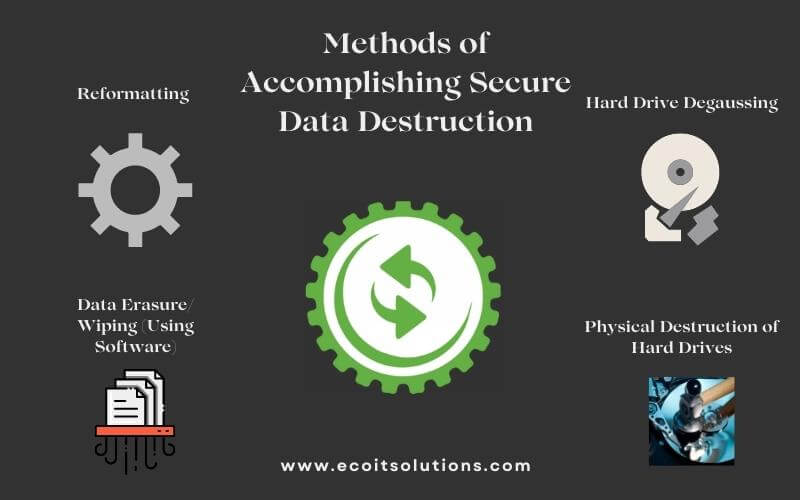The Crucial Nature of Data Devastation in Upholding Computer System Security Providers and Protecting Versus Unauthorized Accessibility
In a period where data breaches and identification burglary are significantly prevalent, the importance of effective data destruction can not be overemphasized. Various techniques, from information wiping to physical damage, serve as vital safeguards versus unapproved access.
Value of Data Damage
In a significantly electronic globe, the relevance of information damage can not be overemphasized. As companies amass huge quantities of sensitive information, the possible consequences of stopping working to effectively get rid of and take care of of that data end up being significantly extreme. Information violations, identity burglary, and business reconnaissance present substantial risks, highlighting the requirement of reliable information devastation techniques.

Additionally, as innovation advances, so as well do the approaches whereby malicious actors look for to exploit delicate information. Organizations must stay aggressive and watchful in their data destruction methods to safeguard against these progressing risks. By focusing on information destruction, firms not only safeguard their possessions but also foster count on amongst customers and stakeholders, demonstrating a dedication to liable information monitoring and safety and security methods.
Approaches of Effective Data Devastation
To ensure the permanent and total damage of delicate data, companies can use a selection of reliable techniques tailored to their certain demands. Among one of the most usual methods is data wiping, which entails utilizing specialized software program to overwrite existing information multiple times, making recuperation essentially impossible. This is especially beneficial for solid-state drives and tough drives, where standard removal techniques are insufficient.
One more efficient approach is degaussing, which makes use of solid magnetic fields to interfere with the magnetic domain names on storage space media, making the data irretrievable. This method is especially suited for magnetic storage space gadgets, such as tape drives and hard drives.
Physical devastation is additionally a viable option, entailing the shredding, squashing, or incineration of storage gadgets. This method guarantees that information can not be recovered, making it optimal for companies managing highly delicate details.

Conformity With Information Protection Laws
Organizations must not just concentrate on effective data devastation approaches but likewise ensure conformity with information defense regulations that control exactly how delicate info is taken care of and dealt with. Sticking to these laws is vital for maintaining and protecting personal data client depend on. Rules such as the General Data Security Guideline (GDPR) in the European Union and the Medical Insurance Mobility and Liability Act (HIPAA) in the USA enforce rigorous standards on information monitoring, which consist of demands for the safe and secure disposal of sensitive information.
To attain conformity, organizations need to apply thorough information destruction policies that align with these lawful structures. This includes identifying data that needs destruction, establishing methods for protected methodsâEUR" such as shredding physical media or utilizing software program that meets sector criteria for information wipingâEUR" and maintaining detailed documents of damage activities. Regular audits should be performed to make sure adherence to these policies and to recognize any kind of prospective locations for renovation.
Failure to abide by information security policies can bring about substantial legal implications, including significant penalties and damage to an organization's reputation. Integrating conformity into information destruction methods Visit Website is not just a legal obligation but additionally a critical element of a durable information safety approach.
Repercussions of Poor Data Handling
Poor data handling can cause serious repercussions that expand beyond immediate operational problems. Organizations might encounter significant monetary losses as a result of data breaches, which usually lead to pricey removal initiatives, lawful costs, and regulatory fines. These monetary implications can prevent and stress sources development, ultimately affecting a company's bottom line.
Additionally, poor data handling can seriously This Site harm a company's online reputation. Companions, customers, and stakeholders might shed count on an entity that falls short to shield delicate details, leading to decreased consumer loyalty and prospective loss of service chances. This erosion of trust can take years to rebuild, if it can be restored at all.
In addition, organizations could face lawful implications occurring from non-compliance with data defense guidelines. Such offenses might result in fines and examinations, intensifying the monetary concern and additional tainting the organization's picture.
In the world of cybersecurity, poor information management practices can develop susceptabilities that make systems much more susceptible to unauthorized gain access to and cyberattacks. Ultimately, these effects underscore the important relevance of carrying out robust information taking care of procedures to guard sensitive details and maintain business honesty.
Best Practices for Secure Information Disposal


First of all, information need to be classified according to its level of sensitivity. Delicate details requires a lot more rigorous disposal methods, such as shredding physical files and utilizing advanced software application for electronic information wiping. Utilizing qualified information devastation solutions guarantees conformity with sector laws and criteria.
Secondly, companies need to carry out an information link disposal policy that mandates normal audits. This plan needs to outline the procedures for information retention and destruction, making sure that outdated data is taken care of promptly and safely. Educating workers on these procedures is important to fostering a culture of safety and security awareness.
Lastly, maintaining in-depth records of disposed data boosts responsibility and supplies a clear audit route. This documentation must include the kind of data destroyed, the approach used, and the day of disposal.
Verdict
In final thought, the important of effective data devastation appears in its function in enhancing computer security solutions and minimizing unapproved accessibility risks. Taking on robust approaches such as information cleaning, degaussing, and physical damage, along with conformity with regulations like GDPR and HIPAA, is crucial for securing sensitive info. Neglecting correct information disposal practices can cause serious consequences, including information violations and legal effects. Applying ideal practices in safe data disposal eventually fortifies organizational stability and customer trust.
In an era where data breaches and identity burglary are significantly widespread, the significance of reliable data devastation can not be overstated. data destruction. Data violations, identification theft, and company reconnaissance posture considerable hazards, underscoring the necessity of efficient information destruction practices
Compliance with laws such as GDPR and HIPAA requireds that companies implement strict information defense measures, including the protected devastation of data at the end of its lifecycle.
By prioritizing information devastation, firms not only shield their properties yet likewise foster trust fund amongst stakeholders and clients, demonstrating a dedication to responsible information management and security techniques.
Organizations have to not just concentrate on reliable data devastation techniques yet likewise guarantee compliance with data security policies that control exactly how sensitive information is managed and disposed of.